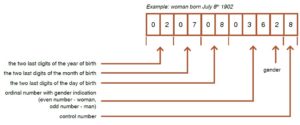As a foreigner, you often hear in Polish offices or other places the question of having a PESEL number.
In this article you will learn what a PESEL number is, and what it is used for.
PESEL is a specific registration system for people permanently staying in Poland. Each person receives a unique eleven-digit number that allows easy identification of the holder. Each of the 11 digits of the number has its own meaning. Your PESEL number will contain your date of birth (first 6 digits), serial number, indication of gender (for women last but one digit is even, and for men – odd) and a control number.
Will you need it and when?
A PESEL number is used for identification purposes only. You will need it e.g. while using medical services (examinations and treatment in the hospital), concluding contracts (renting an apartment, opening a bank account, signing a mobile phone contract) issuing other documents (driving license, bus pass) or paying taxes. However, if you haven’t got a PESEL number, in most cases, you can replace it with other information, e.g. the date of your birth or tax identification number (if you are subject to tax, e.g. due to the work you perform).
How can you get this number?
Before 1 May 2015 PESEL numbers were automatically assigned to each foreigner registering a permanent or temporary residence longer than 3 months. At present, these rules have changed.
If you stay in Poland on the basis of visa or temporary residence permit, you will have to apply for a PESEL number by yourself, indicating the specific provision of the law, which requires you to have this number (e.g. Art. 35 pt. 1 of the Act of August 20, 1997 on National Court Register Act).
The appropriate authority of municipalities responsible for notifying permanent or temporary residence will still automatically (ex officio) give you a PESEL number, but only if you stay in Poland on the basis of e.g.:
- permanent residence permit
- residence permit for a long-term EU resident
- refugee status
- subsidiary protection
- asylum
- permit for a tolerated stay
- temporary protection
- permit for humanitarian reasons
Serhiy Pavlovskiy




